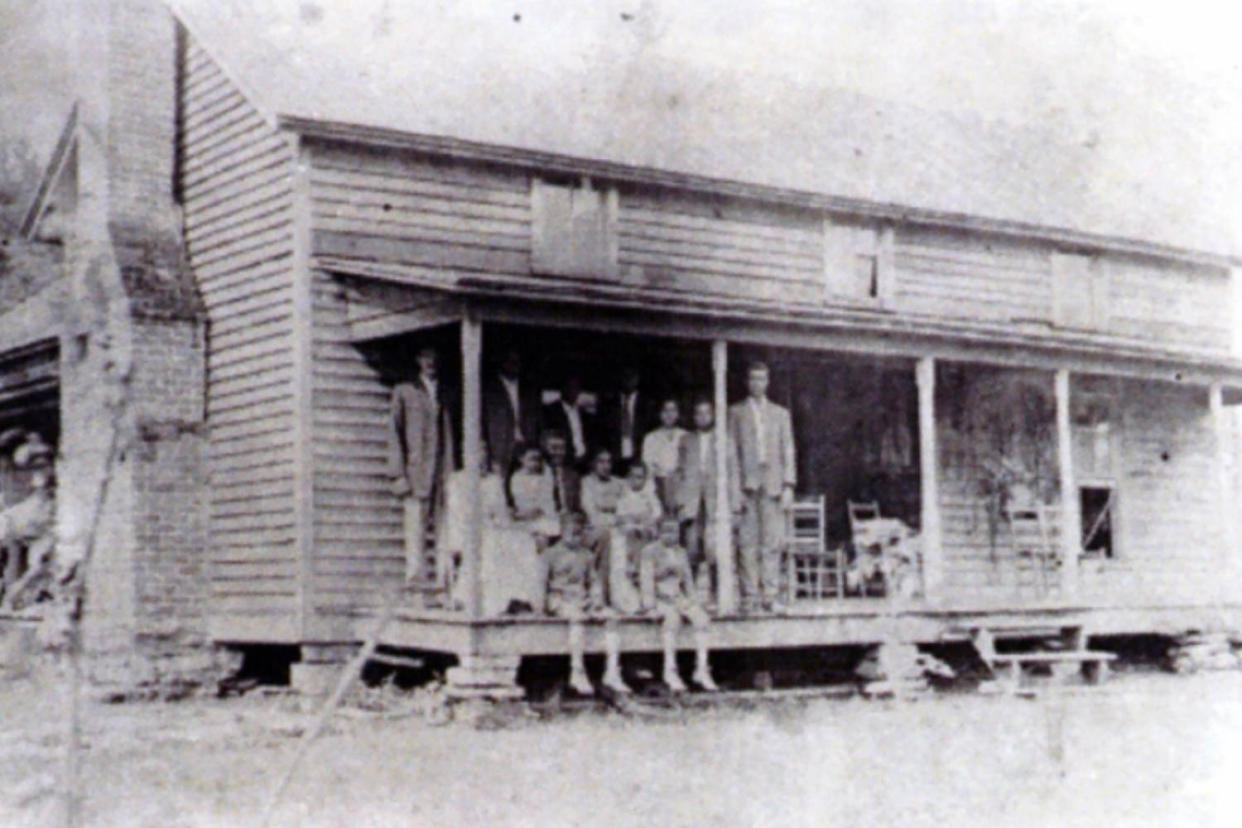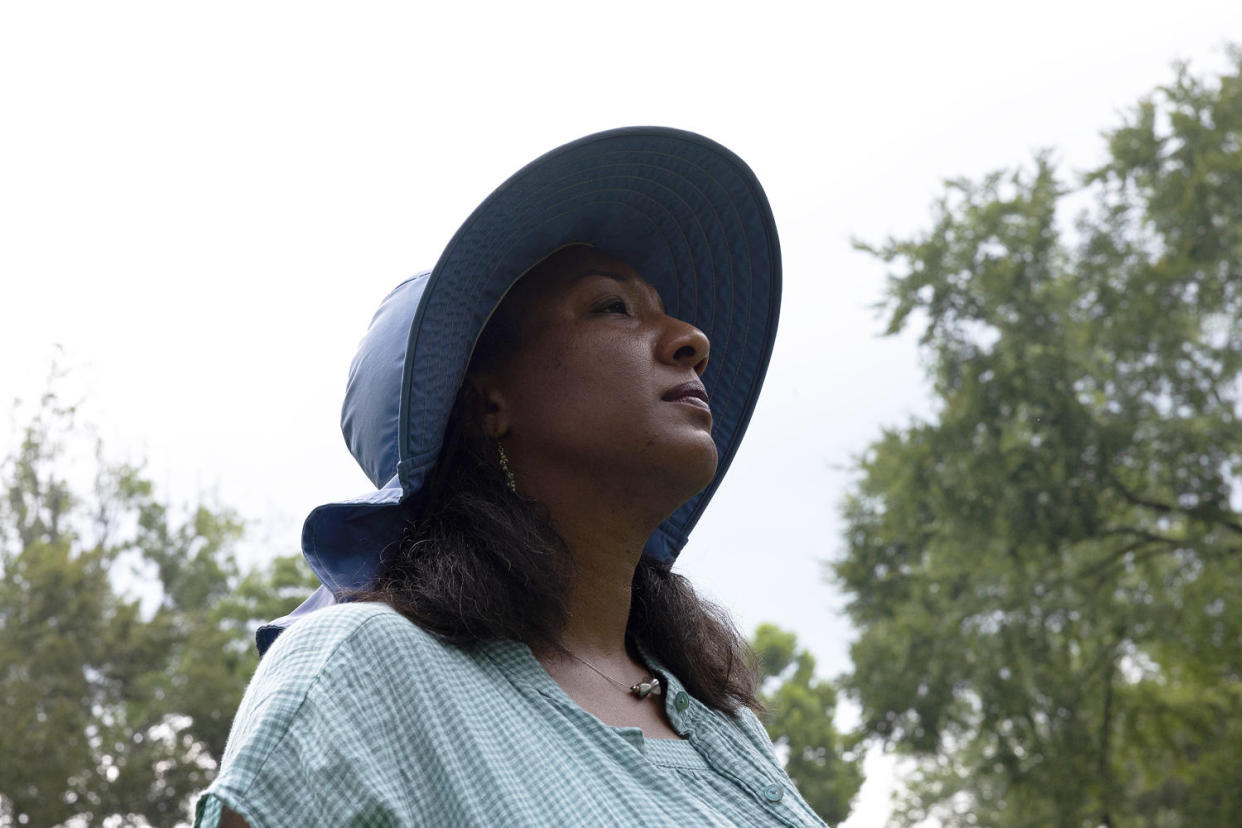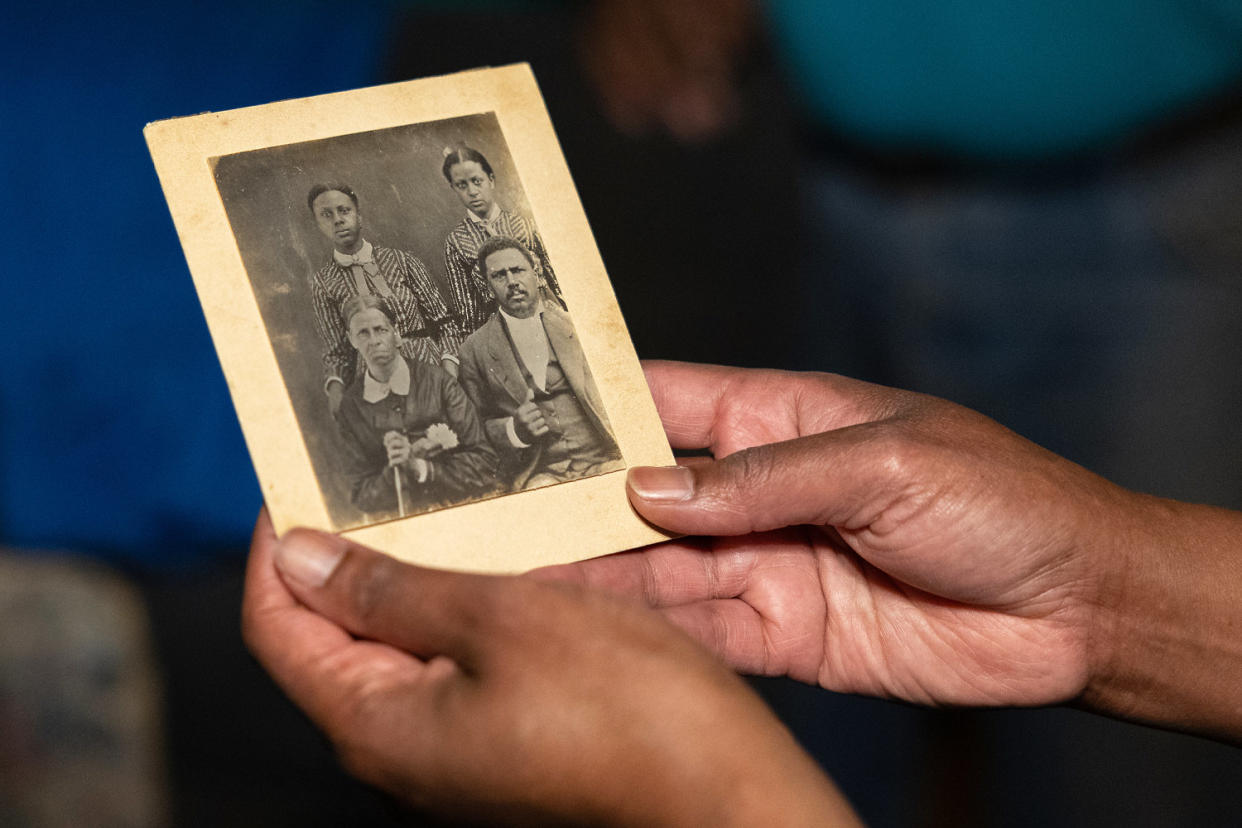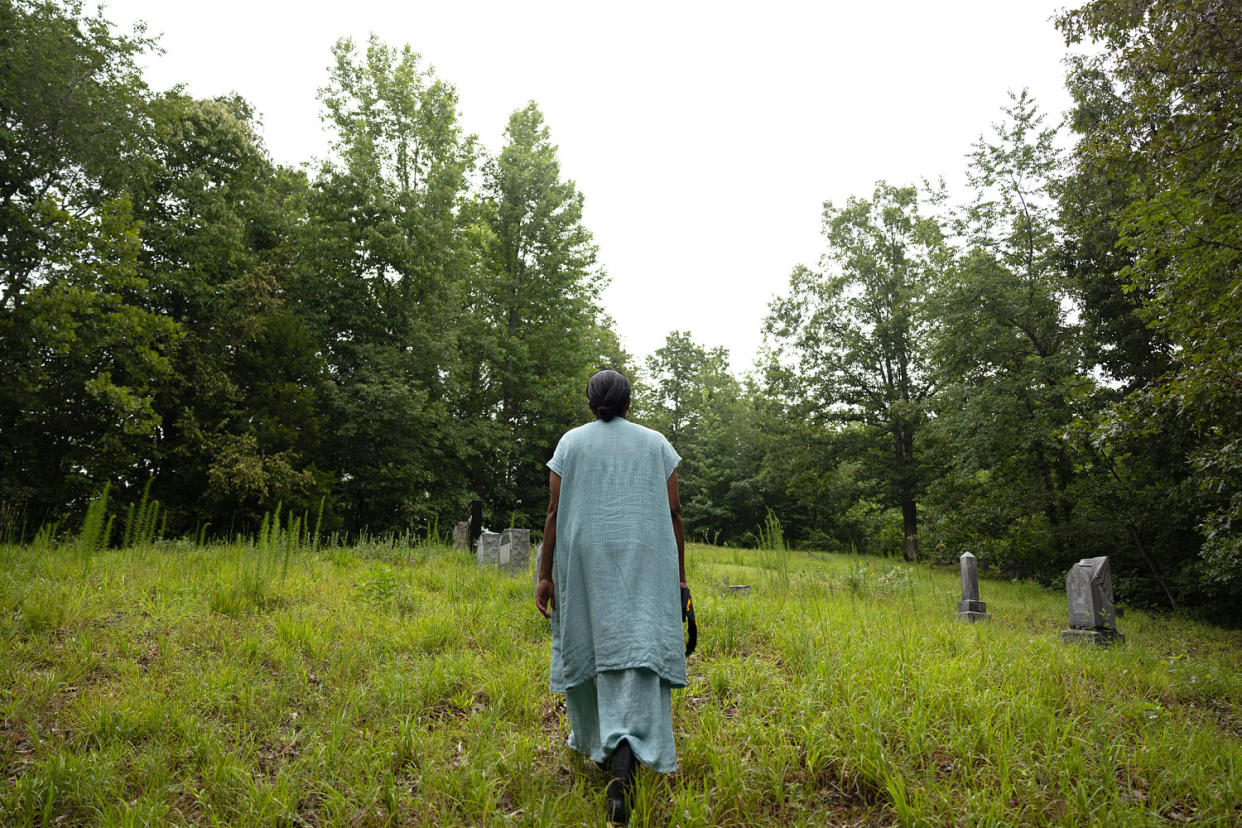Woman learns her ancestors were enslaved by a congressman’s ancestors
LINDEN, Tenn. — On the day after Christmas two decades ago, Lacretia Johnson Flash left her Maryland home and drove 800 miles to the place where her ancestors were once enslaved.
It was 2001, and Lacretia was 30. She had just finished her master’s degree, but despite the achievement, she recalls feeling a “profound aloneness.” Her boyfriend had left her. Cancer claimed her mother, and her father was reeling from the loss.
But a note her mother left behind offered a way forward.
“Keep in touch with family,” it read. “You may want to go back to Tennessee?”
Her parents had moved north before Lacretia was born. She knew just a sliver of her family history: that her ancestors had risen from slavery in middle Tennessee to become some of the first Black landowners here in Perry County.
What she wouldn’t learn until a reporter contacted her this June, almost 22 years later, is that a direct descendant of the people who enslaved her ancestors is today a U.S. congressman: Rep. Brett Guthrie of Kentucky.
For more on this story, tune in to NBC Nightly News with Lester Holt tonight at 6:30pm ET/5:30pm CT or check your local listings.

As part of a series on slavery and America’s political elite, Reuters found that a fifth of U.S. congressmen, living presidents, Supreme Court justices and governors have direct ancestors who enslaved Black people. Among them is Guthrie, an eight-term Republican congressman.
Linking slaveholders to individuals they held is challenging. That’s because crucial historical records — antebellum “slave schedules” — seldom included more than the age, race and sex of enslaved people. But using a variety of sources, Reuters documented those connections for two of Brett Guthrie’s ancestors — one who enslaved Lacretia’s great-great-grandfather, the other her great-great-grandmother.
Reporters then traced forward the two lineages — the white Guthries and the Black family known as the Craigs — to explore how the descendants of the enslavers and those they enslaved have fared since emancipation.

In some ways, the accomplishments of both the Craigs and the Guthries in the generations after slavery are remarkable. Both have given back, through philanthropy, public service and a commitment to education. Members of both families have talked about living the American Dream. But the paths each traveled demonstrate the fundamentally different courses available to Black and white Americans.
Before Reuters began its reporting, it’s unclear whether any living members of either family were aware that the two were linked by America’s “original sin.” Save for a meeting between some descendants of the families in 2005, interactions between the Craigs and the Guthries largely ended during Reconstruction.
To establish each family’s story, Reuters relied on hundreds of pages of historical records including wills and censuses, news reports, marriage certificates, bankruptcy records and sales deeds. Journalists conducted scores of interviews, including with 10 members of the Craig family.
Guthrie turned down multiple interview requests and didn’t reply to questions for this report. Other members of the family sent six emails to share what they had been told about one of their slaveholding ancestors, but didn’t respond to follow-up inquiries. Reuters talked with several friends and acquaintances of the Guthries. Reporters also reviewed speeches by Brett and an academic case study that details how his father, Lowell Guthrie, founded and built a family business whose revenue last year was estimated at $120 million.
When she learned about her family’s connection to the Guthries, Lacretia said she was intrigued. She doesn’t hold today’s Guthries responsible for the choices their ancestors made, she said, and ventured a guess as to the family’s reticence.

“There can be a sense of shame at privilege,” Lacretia said. Confronting the legacy of slavery requires “a willingness to be vulnerable.”
Lacretia said she often thinks back to the 2001 trip that she and her younger sister took to Tennessee. It helped her find her bearings and prepare for her current role as senior vice president of diversity, equity and inclusion at Berklee, a school of performing arts education based in Boston.
‘Where you came from’
Among Lacretia’s first visits was with Helen Craig Smith, her mother’s cousin. Helen lived in the Perry County seat of Linden, a town of about 1,000 people.
Her brick ranch house was filled with plush chairs, floral throws and family photos. A 74-year-old widow at the time, Helen had taught for 35 years in segregated and integrated schools.
After retiring, she completed a 556-page historical novel that mirrored her own life. Later, despite failing eyesight, she would finish another book: an exhaustive history of the Black residents of Perry County. Helen believed it identified every Black person who lived there from 1870 — the year of the first census that listed the formerly enslaved by name — to 2000.
“Sit down, children,” she instructed Lacretia and her sister, both more than 40 years Helen’s junior. “I’m gonna tell you where you came from.”
Helen took Lacretia and her sister as far back as memory and records allowed — to their great-great-grandparents, the husband and wife who emerged from slavery.
Tapp Craig and Amy Guthrie had taken the surnames of their enslavers: farmers Andrew Craig and Andrew H. Guthrie. According to oral history, the Guthries were so fond of Amy that her former enslavers visited her after the war. And Tapp, the story went, had once turned a whip on his enslaver’s son-in-law, who had first tried to whip him.

As the Civil War ended, Black leaders and others argued that the newly emancipated would need land if freedom were to lead to economic equality. They and their ancestors had labored without wages for generations. The United States briefly began making land grants, but the plan was quickly reversed by President Andrew Johnson, himself a former senator from Tennessee, and farmland seized from rebels was returned to its former owners.
But by the close of 1871, after years of tenant farming, Tapp and Amy had earned enough for a down payment on about 90 acres owned by a white neighbor along a tributary of the Tennessee River known as Lick Creek.
Tapp’s land was best suited for harvesting timber, as opposed to growing crops for market, which would have required more fertile land, said Carroll Van West, director of Middle Tennessee State University’s Center for Historic Preservation. With its purchase, Tapp achieved the distinction of becoming one of the first Black men to own land in Perry County.
The difference between Tapp’s holdings and those of the families that had enslaved him and Amy were enormous.
On the 1860 census, Andrew H. Guthrie’s estate was valued at $30,000, placing him among the wealthiest 2% of men in America that year. Andrew Craig was also among the wealthiest 2%, his 1860 estate valued at $26,000. Both men died before the end of the decade, but their children remained prosperous, despite the monetary blow from losing what before the war was considered personal property: the people their families enslaved.
Craig’s daughter, for example, married a man with wealth valued at $5,500 on the 1870 census. The holdings of Guthrie’s son, Robert, were listed at $2,500. In 1870, Tapp had $300 to his name.
Still, Black landowners such as the Craigs represented a threat in the view of white farmers staggered by the loss of free labor after the Civil War, said Thomas W. Mitchell, a law professor at Boston College and an expert on the history of Black land loss.
In 1865, the Ku Klux Klan had formed in the Tennessee town of Pulaski, about 75 miles away from where Tapp would later buy his plot. The next year, white mobs killed at least 46 people in Memphis, destroying homes, businesses, schools and churches in the city’s small Black community.
Perry County wasn’t immune. In 1869, a white mob pulled two Black men from the jail in Linden and lynched them, according to a newspaper account from the time.
The violence was “a way to squelch any kind of effort to uplift a community,” said Andre Perry, a senior fellow at the Brookings Institution who focuses on race, inequality and education.
But by the standards of that time and place, Tapp and Amy personified what Helen called in her nonfiction book a budding “Black aristocracy.” In fact, one of their children, Will R. Craig, was able to buy his own farm in 1889 — 300 acres, a few miles up the road from Tapp.
Measuring the gap: Education
The Craigs and other Black families had to work hard for benefits that white families took for granted.
For decades after the war, public funding for Black education in the South was meager or nonexistent. According to Perry County Historical Society records, fewer than half the county’s Black children went to school as of 1885. For whites, the number was 90%.
But among the county’s first schools for Black children was one built by Tapp himself. It doubled as a church.
Later, so-called county training schools, funded through the philanthropy of Northerners, sprung up for Black children in Tennessee and other states across the South. But those schools failed to prepare students for higher education, historian James D. Anderson wrote in "The Education of Blacks in the South, 1860-1935." It was recommended that the schools devote half the time to reading, writing and arithmetic. The other half emphasized skills such as cooking, laundering and canning — services to provide for white families.
“The intended purpose of these schools was to make Black children think and feel that traditional, high-quality academic education was incongruent with their station in life,” Anderson wrote. “Their purpose was to adjust Black southerners to a life of subordination.”
Helen, who died in 2020, aimed much higher. In 1964, she earned a bachelor’s degree from Austin Peay State University in Clarksville, Tennessee — the first Black woman to do so, her obituary notes. She also earned a master’s degree in education there. She devoted her life to teaching, and for the last 25 years of her career did so in Linden, handling reading, math, English and music in grades 1 through 4.
Along with her genealogical work, Helen published the 1997 novel, "For Ever The Twain Shall Meet." The storyline of the fictional Hunter family closely mirrors the history of the real-life Craigs. The protagonist, a farmer’s daughter named Star, declares in the book: “You build your own bridges that take you over every vicissitude in life.” Those were the very words Helen herself spoke at the age of 10, in a prize-winning speech in a 1937 oratory competition.
In 2005, Helen would meet face-to-face with the descendants of her enslavers, the Guthries, and present them with a signed copy of that book.
'A measure of their identity'
Today’s Guthries — including patriarch Lowell and sons Brett, Chris and Kent — are now associated with Bowling Green, Kentucky, where their family-owned auto-parts business is located. But in 2005, a funeral brought Brett’s brothers Chris and Kent back to Tennessee.

In emails to Reuters, Chris Guthrie wrote that he met with Helen Craig Smith after the funeral. She told him that Andrew Guthrie was an “anti-slavery proponent” who “purchased slaves from surrounding farms to bring them to his farm to befriend them,” he wrote. During the Civil War, Chris wrote, the Guthrie ancestor and the men he enslaved formed a regiment and fought for the Union. Chris said the Guthries’ Union sympathies resulted in the family being “isolated for decades.”
Chris wrote to Reuters in a later message that he had “no idea if the story of Andrew is true,” just that Helen had recounted it. Whether Chris knew that Helen was herself a descendant of the people his ancestors enslaved is also unclear. Chris didn’t reply to follow-up questions.
Reuters found no evidence that Andrew Guthrie formed a regiment of Black soldiers. His son, Robert A. Guthrie, did fight for the Union. According to a history of Perry County published by Goodspeed Publishing in 1886, he “raised a company” for the 2nd Tennessee Mounted Federal Infantry, though there is no mention of whether Black soldiers served in that unit.
And whatever Andrew Guthrie felt about the people he enslaved, documents reviewed by Reuters show his dealings in human bondage spanned decades. Records show Guthrie enslaved six people in 1850 and nine in 1860.
Four bills of sale in Perry County deed books mention Amy from 1842 through 1847. They document how she was owned by Andrew H. Guthrie, who sold her to neighbor Hugh Kirkpatrick, who sold her to relative James Kirkpatrick, who gave her to his daughter Jane, the wife of Andrew H. Guthrie.
As to Chris Guthrie’s comment that the Guthries were “isolated for decades” after the war, the Goodspeed history indicates that Robert A. Guthrie served as Perry County Clerk from 1868-1870.
In one of his emails, Chris also mentioned that Helen gave him a signed copy of her novel.
In the book, Helen tells of the ties between the Hunters, a prominent African American farm family in Tennessee, and a white character named Obeth Gutherie, a slaveholder who nonetheless fought for the Union during the Civil War. Helen writes that Obeth Gutherie had a daughter, Amy, “whose mother had been a slave and still remained a worker in the Gutherie Place” after the Civil War.
Helen writes of the “scarring effects” of slavery and how the characters, whose sagas closely parallel those of her relatives, persevered: “To a system they understood but barely, they’d lost a measure of their identity — who they were, from whence they came; what they might have become. But through their will, their strength, their tenacity — their willingness and ability to adapt, and by the infinite grace of God, they’d survived.”
'My family has ... lived this dream'
Brett Guthrie graduated from the U.S. Military Academy at West Point in 1987, served in the Army as an officer, and then went on to work for the family business. He later attended the Yale School of Management and was serving as a Kentucky state senator when the National Republican Congressional Committee recruited him to run in 2008 for the seat he now holds. The success of the Guthrie family business, Trace Die Cast, helped propel him to Congress.
“When you’re recruiting a candidate, things you’ll often look at are: Is the person a current elected official, or a prominent businessperson, or is the family name a recognizable one?” said Ken Spain, who was the committee’s spokesman at the time. “In this case, it was all of the above.”
Spain also told Reuters that Brett had the crucial support of U.S. Sen. Mitch McConnell, a longtime ally of his father, Lowell. McConnell would “drop everything” to take a call from Lowell, a former aide once told a Kentucky newspaper. When the Republican Party was looking for a congressional candidate in 2008, McConnell singled out Brett for praise in the primary.
Brett’s 2020 financial disclosure form shows he remains tied to the company as an uncompensated board member. Much of his money is in trusts invested in the company, and he has disclosed owning a 25% stake in the firm. His wealth has grown from about $500,000 when he entered Congress to several million dollars today, according to estimates from OpenSecrets, a nonpartisan research group that uses the public financial disclosures of politicians to gauge their net worth.
Politically, he is a rank-and-file, traditional Republican who, according to people in both parties, keeps a low profile. He did not object to the results of the 2020 presidential election. He has twice voted in favor of removing Confederate statues from Capitol Hill, a position supported by most Democrats.
The Guthrie family has shared its wealth. In 2002, Lowell funded a bell tower at Western Kentucky University in honor of U.S. service members who died in battle, including a brother killed in the Korean War. In a speech at the dedication, Brett said his Uncle Bobby had helped preserve the American Dream.
“My family,” Brett added, “has certainly lived this dream.”
The Craigs say they too have lived the dream. Reginald Craig, Mack’s son, said he has accomplished almost every goal he set for himself. He has a college degree, a good job as a salesman, and the respect of his colleagues. He owns a home and drives a Mercedes. Reginald considers himself a staunch conservative, and a proud supporter of Donald Trump.
“I respect his ability to create lots of businesses. He’s created a lot of jobs,” said Reginald, who said he’s “1,000%” behind Trump’s 2024 campaign.
Others in the family, including Lacretia, are on the political left.
If she could meet with Brett Guthrie, Lacretia would ask him what values guide his work. She’d ask if, like her, he feels moved by his family history to work for a better future.
“I don’t have a desire for anyone to feel guilty for actions of others in the past,” she said. But if we don’t confront that past, she added, it will continue to contaminate the present. “Conversations about race might leave a scar,” Lacretia said, “but they will also help us heal.”

She too said she has lived a version of the American Dream, building a life of reliable income and stability. But it looks different to her from the Guthries’ version in one key respect: “I could weather a crisis or two,” Lacretia said, “but I don’t have the backing of family members, or coffers to draw on.”
“For me,” she said, “it’s fragile.”
To read the full Part 4 of the Reuters series, Slavery’s Descendants: America’s Family Secret, click here.
